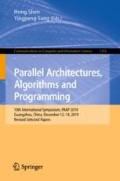Abstract
Task scheduling is one of the most important issues on heterogeneous multiprocessor systems. In this paper, the problem is defined as performance-constrained energy optimization. It is a commonly used constrained optimization problem (COP) in practice. Task scheduling for constrained optimization problem is NP problem. It is usually handled by heuristics or meta-heuristics method. Classic quantum genetic algorithm is an excellent meta-heuristics algorithm, but they are hardly ever used to handle COPs because quantum rotation gate can only deal with single objective problem. Moreover, it is difficult to model the task scheduling problems so as to be handled by quantum genetic algorithm. To handles COPs in task scheduling on heterogeneous multiprocessor systems, we propose a new quantum genetic algorithm. In our algorithm, the chromosome consists of task sequence part and mapping part. Task sequence part is generated by list scheduling algorithm which can improve the parallel of the tasks. The mapping part indicates the correspondence between the tasks and the processors which they will run on. The mapping part will be transferred to quantum bits and take part in the evolvement guided by quantum genetic algorithm. Beside, we adopt an adaptive penalty method which belongs to constraint-handling technique to transfer COP into single objective problem. The results in simulations show the superiority of our method compared with state-of-the-art algorithms.
Access this chapter
Tax calculation will be finalised at checkout
Purchases are for personal use only
References
Xu, Y., Li, K., Hu, J., Li, K.: A genetic algorithm for task scheduling on heterogeneous computing systems using multiple priority queues. Inf. Sci. 270, 255–287 (2014)
Omara, F.A., Arafa, M.M.: Genetic algorithms for task scheduling problem. In: Abraham, A., Hassanien, A.E., Siarry, P., Engelbrecht, A. (eds.) Foundations of Computational Intelligence Volume 3. SCI, vol. 203, pp. 479–507. Springer, Heidelberg (2009). https://doi.org/10.1007/978-3-642-01085-9_16
Tessema, B., Yen, G.G.: An adaptive penalty formulation for constrained evolutionary optimization. IEEE Trans. Syst. Man Cybern. Part A Syst. Hum. 39(3), 565–578 (2009)
Topcuoglu, H., Hariri, S., Wu, M.-Y.: Performance-effective and low-complexity task scheduling for heterogeneous computing. IEEE Trans. Parallel Distrib. Syst. 13(3), 260–274 (2002)
Amini, A., Wah, T.Y., Saybani, M.R., Yazdi, S.R.A.S.: A study of density-grid based clustering algorithms on data streams. In: 2011 Eighth International Conference on Fuzzy Systems and Knowledge Discovery (FSKD), vol. 3, pp. 1652–1656. IEEE (2011)
Shin, K., Cha, M., Jang, M., Jung, J., Yoon, W., Choi, S.: Task scheduling algorithm using minimized duplications in homogeneous systems. J. Parallel Distrib. Comput. 68(8), 1146–1156 (2008)
Deb, K., Pratap, A., Agarwal, S., Meyarivan, T.: A fast and elitist multiobjective genetic algorithm: NSGA-II. IEEE Trans. Evol. Comput. 6(2), 182–197 (2002)
Ishibuchi, H., Tsukamoto, N., Nojima, Y.: Evolutionary many-objective optimization: a short review. In: 2008 IEEE Congress on Evolutionary Computation (IEEE World Congress on Computational Intelligence), pp. 2419–2426. IEEE (2008)
Chuang, Y.-C., Chen, C.-T., Hwang, C.: A simple and efficient real-coded genetic algorithm for constrained optimization. Appl. Soft Comput. 38, 87–105 (2016)
Joines, J.A., Houck, C.R.: On the use of non-stationary penalty functions to solve nonlinear constrained optimization problems with GA’s. In: Proceedings of the First IEEE Conference on Evolutionary Computation. IEEE World Congress on Computational Intelligence, pp. 579–584. IEEE (1994)
Matias, J., et al.: Adaptive penalty and barrier function based on fuzzy logic. Expert Syst. Appl. 42(19), 6777–6783 (2015)
Lin, C.-H.: A rough penalty genetic algorithm for constrained optimization. Inf. Sci. 241, 119–137 (2013)
Bangroo, R., Kumar, N., Sharma, R.: A model for multi-processor task scheduling problem using quantum genetic algorithm. In: Abraham, A., Muhuri, P.K., Muda, A.K., Gandhi, N. (eds.) HIS 2017. AISC, vol. 734, pp. 126–135. Springer, Cham (2018). https://doi.org/10.1007/978-3-319-76351-4_13
Yang, J., Li, B., Zhuang, Z.: Research of quantum genetic algorith and its application in blind source separation. J. Electron. 20(1), 62–68 (2003)
Zitzler, E., Thiele, L.: Multiobjective evolutionary algorithms: a comparative case study and the strength pareto approach. IEEE Trans. Evol. Comput. 3(4), 257–271 (1999)
Chen, S., Li, Z., Yang, B., Rudolph, G.: Quantum-inspired hyper-heuristics for energy-aware scheduling on heterogeneous computing systems. IEEE Trans. Parallel Distrib. Syst. 27(6), 1796–1810 (2015)
Gandhi, T., Alam, T., et al.: Quantum genetic algorithm with rotation angle refinement for dependent task scheduling on distributed systems. In: 2017 Tenth International Conference on Contemporary Computing (IC3), pp. 1–5. IEEE (2017)
Shao, Z., Zhuge, Q., Xue, C., Sha, E.-M.: Efficient assignment and scheduling for heterogeneous DSP systems. IEEE Trans. Parallel Distrib. Syst. 16(6), 516–525 (2005)
Asafuddoula, M., Ray, T., Sarker, R., Alam, K.: An adaptive constraint handling approach embedded MOEA/D. In: 2012 IEEE Congress on Evolutionary Computation, pp. 1–8. IEEE (2012)
Lee, Y.C., Zomaya, A.Y.: Energy conscious scheduling for distributed computing systems under different operating conditions. IEEE Trans. Parallel Distrib. Syst. 22(8), 1374–1381 (2010)
Acknowledgments
This study was supported by the National Key Research and Development Plan’s Program on High performance computing of China, No. 2017YFB0203201.
Author information
Authors and Affiliations
Corresponding author
Editor information
Editors and Affiliations
Rights and permissions
Copyright information
© 2020 Springer Nature Singapore Pte Ltd.
About this paper
Cite this paper
Yan, Z., Shen, H., Huang, H., Deng, Z. (2020). Constrained Optimization via Quantum Genetic Algorithm for Task Scheduling Problem. In: Shen, H., Sang, Y. (eds) Parallel Architectures, Algorithms and Programming. PAAP 2019. Communications in Computer and Information Science, vol 1163. Springer, Singapore. https://doi.org/10.1007/978-981-15-2767-8_22
Download citation
DOI: https://doi.org/10.1007/978-981-15-2767-8_22
Published:
Publisher Name: Springer, Singapore
Print ISBN: 978-981-15-2766-1
Online ISBN: 978-981-15-2767-8
eBook Packages: Computer ScienceComputer Science (R0)

